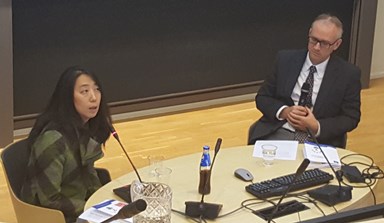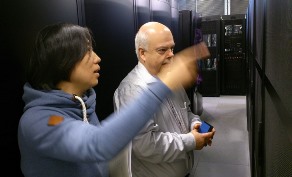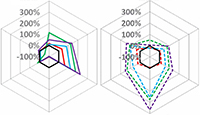Integrated sustainability assessment of forest bioenergy options
Method development for trade-off analysis of forest bioenergy feedstock provision and other ecosystem services.
Project leader: Ulla Mörtberg
Participants: Xi Pang (KTH), Renats Trubins (SLU), Ola Sallnäs (JRC and SLU), Eva-Maria Nordström (IIASA and SLU), Hannes Böttcher (IIASA)
Project period: 2013 - 2017
Funding: StandUp for Energy , the Horizon 2020 project REEEM and the Swedish Research Council FORMAS, Sweden.
Key words: forest bioenergy feedstock, ecosystem services, biodiversity, trade-off analysis, integrated sustainability assessment
Project description
Forest is a resource that is increasingly utilized for multiple purposes. The balance between resource and energy demands and the long-term capacity of ecosystems to support biodiversity and other ecosystem services is crucial. There is a need for adapting to climate change as well as securing the supply of energy, which have led to a shift in energy consumption from fossil fuel to renewables, especially biomass, which in turn put pressure on ecosystems and biodiversity. The balance between energy demand and the long-term capacity of ecosystems to supply goods and services is therefore crucial. There is a need for decision support tools that can integrate the main sustainability aspects in assessment of forest bioenergy options. The project is based on studies of forest biomass extraction in Kronoberg, a county in southern Sweden, as well as a LEcA case study of Lithuania .
Aim
The aim of this project is to develop and test methods for assessing the sustainability of forest biomass extraction for bioenergy purposes on landscape and regional levels, by incorporating effects on biodiversity and important ecosystem services in the assessment. The project involves developing the Landscape simulation and Ecological Assessment (LEcA) Tool for trade-off analysis and sustainability assessment of forest bioenergy options. The LEcA tool involves the LandSim model that can simulate forest growth and management; the storage and yield calculator, that estimates the provision of industrial wood and bioenergy feedstock, and carbon storage; and the habitat assessment tool, used for localising and quantifying habitat with high value for forest biodiversity as well as for recreation. Thus, ecological (biodiversity and ecosystem services) assessment of the scenarios will be performed and integrated with energy models. In this way, a methodology for integrated sustainability assessment of bioenergy options will be developed and tested.
Cooperation
This project is implemented in collaboration with the Environmental Management and Assessment research group, KTH, and SLU, within the FORMAS-funded co-operation project “Young Scientist Summer Program” at the International Institute for Applied Systems Analysis (IIASA).
The is also supported by the Horizon 2020 project "Role of technologies in an energy efficient economy – model-based analysis of policy measures and transformation pathways to a sustainable energy system" (REEEM), in cooperation within KTH (division of Energy Systems Analysis), and with international partners (AALTO-KORKEAKOULUSAATIO, Finland; AARHUS UNIVERSITET, Denmark; DANMARKS TEKNISKE UNIVERSITET, Denmark; ENERGETSKI INSTITUT HRVOJE POZAR, Croatia; KIC INNOENERGY SE, Netherlands; LIETUVOS ENERGETIKOS INSTITUTAS, Lithuania; Reiner Lemoine Institut gGmbH, Germany; SPF TOKNI, Faeroe Islands; UNIVERSITY COLLEGE LONDON, United Kingdom; and UNIVERSITAET STUTTGART, Germany).
Publications
| 2019 | Pang, X., Trubins, R., Lekavicius, V., Galinis, A., Mozgeris, G., Kulbokas, G., Mörtberg, U., 2019. Forest bioenergy feedstock in Lithuania – renewable energy goals and the use of forest resources . Energy Strategy Reviews 24: 244-253. |
| 2018 | Pang, X., Mörtberg, U., Lekavicius, V., Galinis, A., Trubins, R., Mozgeris, G., Kulbokas, G., 2018. Ecosystem services case study report . Deliverable D5.4, REEEM consortium, www.reeem.org. |
| 2017 |
Pang, X. 2017. Trade-off analysis of forest ecosystem services – A modelling approach . PhD thesis, TRITA-SEED-PHD 2017:02. Dept. of Sustainable Development, Environmental Science and Engineering, KTH Royal Institute of Technology, Stockholm. |
| 2017 | Pang, X., Nordström, E., Böttcher, H., Trubins, R., and Mörtberg U., 2017. Trade-offs and synergies among ecosystem services under different forest management scenarios – the LEcA tool . Ecosystem Services 28: 67-79. |
| 2017 | Pang, X., Mörtberg, U., Sallnäs, O., Trubins, R., Nordström, E.-M., Böttcher, H., 2017. Habitat network assessment of forest bioenergy options using the landscape simulator LandSim – A case study of Kronoberg, southern Sweden . Ecological Modelling 345: 99-112. |
| 2016 | Pang, X. 2016. Modelling trade-offs between forest bioenergy and biodiversity . Licentiate thesis TRITA-LWR LIC 2015:03, Department of Sustainable Development, Environmental Science and Engineering, KTH, Stockholm. |
| 2014 | Pang, X., Mörtberg, U. & Brown, N. 2014. Energy models from a strategic environmental assessment perspective – what is missing concerning renewables? Renewable and Sustainable Energy Reviews 33: 353-362. |



